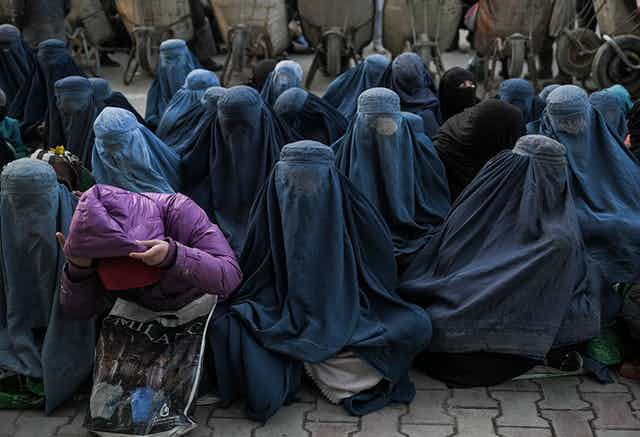Afghan women face violence
Mon 07 Feb 2022, 12:53:51

Atlanta: The Taliban reportedly captured 40 people in Mazar-e-Sharif, a medium-sized city in Afghanistan, at the end of January 2022. Taliban members then allegedly gang-raped eight of the women. The women who survived the gang rape were subsequently killed by their families.
The fact that the women had been raped violated a societal honor code called Pashtunwalli, which prohibits women from engaging in sex outside of marriage.
Taliban spokesperson Zabihullah Mujahid tweeted that some of the women they arrested “remain detained because their male relatives have not yet come to escort them.” News of the attack is circulating among various Afghan communities and some local media, according to several Afghan women's rights activists who are part of my academic network.
These colleagues cannot be named because of security concerns. Women's rights activists marched in Kabul on Jan. 16, 2022, asking where the women of the Mazar-e-Sharif attack have gone.
But a careful online news search in English will not reveal details about these recent kidnappings and gang rapes – a common form of aggression by the Taliban in the 1990s. No Western media has covered the attacks. Afghanistan made Western headlines in July and August 2021, as the US withdrew the last troops from the
country.
country.
Under the Taliban's latest rule, lesbian, gay, bisexual and transgender people in Afghanistan are facing “grave threats” of violence and death, according to new findings by the research and advocacy nonprofit organization Human Rights Watch.
Violence against women in Afghanistan also appears to again be worsening, according to local Afghan colleagues I know. But these reports are not eliciting international political concern. During a major peace and conflict conference I attended with Alexia Cervello San Vicente, a masters student at Columbia University, in January 2022, participants shelved questions about Afghan women's gender-based violence in favour of discussing trade agreements and foreign aid. Alexia assisted in the research and writing of this story.
As an expert on terrorism and violence against women, I find that the current situation for women and girls in Afghanistan is reminiscent of the Taliban's last restrictive regime in the 1990s.Women's rights in Afghanistan then and today When the Taliban first rose to power in 1996, it famously banned Afghan women from holding jobs, or even leaving home without a male guardian or chaperone. Womens' rights violations in Afghanistan were a major topic of public concern in the 1990s.
No Comments For This Post, Be first to write a Comment.
Most viewed from International
Most viewed from World
AIMIM News
Delhi Assembly polls: Owaisi leads Padyatra in Okhla
Feb 01, 2025
We reject this Waqf Amendment Bill: Asaduddin Owaisi
Jan 30, 2025
Latest Urdu News
Most Viewed
May 26, 2020
Which team will win the ICC Men's Champions Trophy 2025 held in Pakistan/Dubai?
Latest Videos View All
Like Us
Home
About Us
Advertise With Us
All Polls
Epaper Archives
Privacy Policy
Contact Us
Download Etemaad App
© 2025 Etemaad Daily News, All Rights Reserved.

.jpg)

.jpg)







.jpg)
.jpg)
.jpg)
.jpg)
.jpg)
.jpg)
.jpg)
.jpg)
.jpg)
.jpg)
.jpg)




















